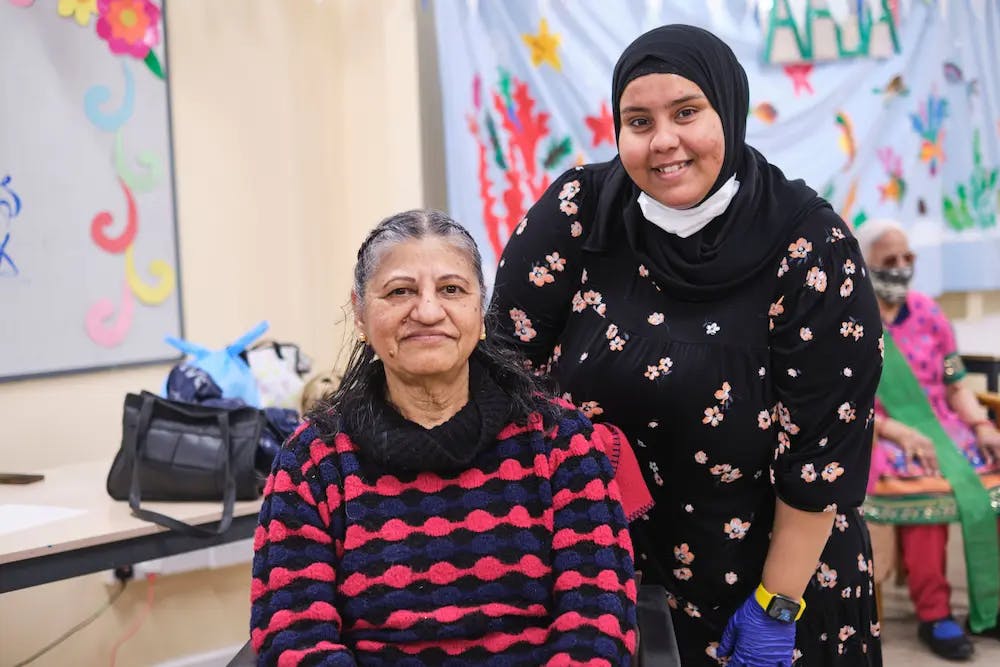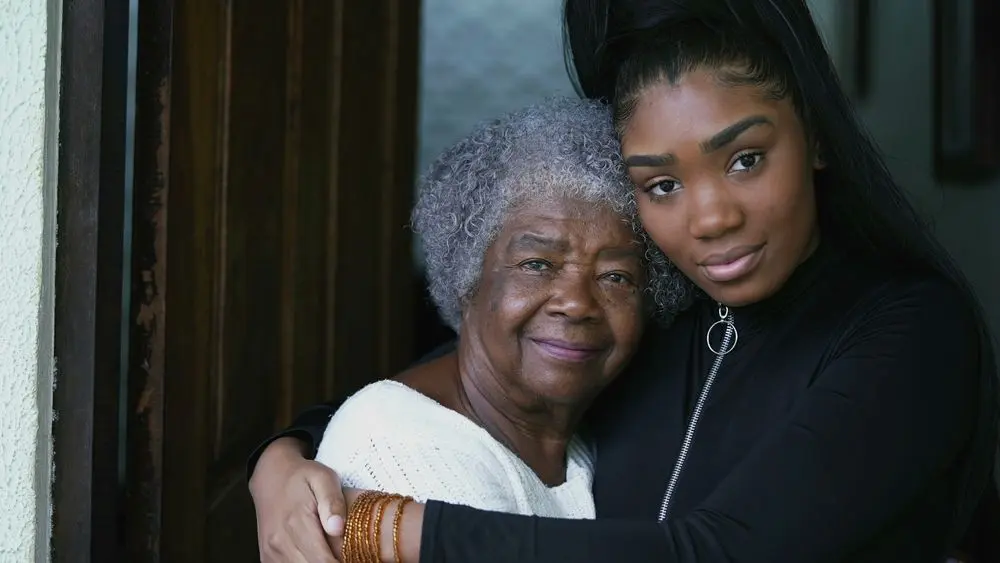Being a Carer For a Family Member or Parent

Estimated Reading Time: 15 minutes
Being a carer for a family member means providing crucial care and support to your loved ones. This includes help with things like cooking, personal hygiene and providing transport. There are now around 6.5 million people providing unpaid care around the UK.
Whether you’re due to become a carer for a family member, or you’ve been supporting them for a while, we’ve shared tips, advice and the support available.
Browse recommended local homes
Compare care homes with availability near you.
In this article on caring for a family member:
- Requirements to become a carer
- How to become a carer
- Challenges
- Looking after a loved one
- Cost of providing unpaid care
- Other care options
- Benefits available
- Carer's allowance
- Carers' credit
- Carer premium
- Help and support for carers
What are the Requirements to Become a Carer?
There are no requirements to become an unpaid or informal carer for a family member or parent. Many people don’t recognise their role as a carer until they’ve been doing it for several months or even multiple years.
This is especially likely to be the case if the amount of care you’re providing to a loved one starts small and then gradually increases over time. What’s more, the lines between taking on a care role and the relationship you have with a family member are often blurred.
Who is classed as a carer?
A carer is somebody who looks after a family member, partner or friend who is unable to properly care for themselves. This person may have an illness, a disability or other medical condition. Without your support, this person will find daily life difficult.
As a carer, you may support a loved one with day-to-day tasks, such as with their shopping or housework. You may also assist with personal care tasks like washing and getting dressed.
Many informal carers receive Carer’s Allowance, and you’ll need to provide at least 35 hours of weekly care for your loved one to qualify for this. Caring isn’t a 9-5 role, so these hours may be spread out across the week and at different times. We’ve explained this benefit in greater detail later on.
A carer could take on any of the following responsibilities:
- Assistance with washing, using the toilet and getting in and out of bed
- Shopping and other errands
- Collecting and organising medicine
- Providing transport to and from appointments
- Food preparation and cooking meals
How to Become a Carer For a Family Member
Here are the first steps you should take when beginning to care for your elderly parents or a different family member. These tips will help you become a carer:
Research their condition
To provide compassionate care for your loved one, you should first learn as much as possible about their condition.
Officially register as a carer
Getting in touch with organisations such as your GP and telling them about the person you care for will entitle you to additional support. This includes yearly reminders to book in for a flu jab, mental health support and flexible appointments that fit around your care schedule.
Let your employer know about your caregiving responsibilities
Balancing a full-time job and caregiving responsibilities may affect your work life, so letting your employer know about these additional responsibilities enables them to help you out where possible.
Talk to other carers
Talking to other carers who are going through something similar can make a huge difference when it comes to looking after your own wellbeing.
Be realistic about the support you can provide
You should think about your own circumstances, your loved one’s situation and how much you’ll be able to contribute to their care. Knowing your limitations will make finding the right balance much easier.
Involve your loved ones in the discussion and encourage independence in care
Finding the best way of caring for your family members isn’t easy. Speak with your elderly parents about their care needs, as any decisions made will affect them more than they’ll affect you.
Being a carer for a family member doesn't mean you have to do everything for them either. Be sure to encourage your family member to remain as independent in care as possible.
Look after your own needs
Exhaustion, burn out and feeling distracted are all common among unpaid carers. To avoid these feelings, you should make sure you’re properly taking care of your own needs outside of caregiving.
Approach care and support with sensitivity
Your loved ones have probably been independent their entire adult lives, so we fully understand why they might not be keen to begin relying on somebody else. They may also be worried about leaving their beloved home and familiar surroundings.
Taking some time out to openly talk and connect with your family member can help you both feel more comfortable about the situation.
While persuading parents to accept help can be tricky, remember there are ways to lead this conversation so everyone is open and honest about how they’re feeling.
What are the Challenges of Caring For a Family Member?
Though family caregiving can be a genuinely fulfilling and rewarding experience, you’ll still be faced with challenges that make it clear how big a responsibility caring for a family member like a parent can be. The biggest challenges include time management, emotional and physical stress, a lack of privacy and sleep, financial difficulties, not wanting to ask for help and feelings of isolation.
Some of the biggest challenges include:
Time management
Caregivers often have less time for themselves and other family members. Spending too much time caring for your loved one can lead to things like hobbies and holidays being sacrificed.
Emotional and physical stress
Caring for someone with a condition like dementia can cause emotional stress and difficulties. Meanwhile, physical demands like helping with mobility can also take a toll on unpaid carers. If you’re looking after your loved one and feeling overwhelmed, stressed, anxious or worn out, there’s support available.
A lack of privacy
Family caregivers often say that a lack of privacy can make it difficult to set boundaries and take time for themselves.
A lack of sleep
If your loved one’s sleep-wake cycle is out of line with the norm then your own sleeping schedule may be affected as a result.
Financial difficulties
The vast majority of family carers are unpaid which can lead to a financial strain, especially if caregiving takes you away from a paid job.
Not wanting to ask for help
Caregivers often find asking for help a difficult task, instead feeling it necessary to fully assume the burden of being a carer without assistance from anyone else.
Isolation
Depending on how much time caregiving is taking up, you could struggle to maintain social connections outside of your parent’s home.
The biggest challenge of being a carer for a loved one is seeking a balance between caregiving and taking time for yourself. This is why respite services are so important to family caregivers. Respite care homes or respite care at home will allow you to take a break from caregiving duties and tend to your own needs, whether this is going on holiday, focusing on health or pursuing other interests.

Looking After A Loved One
Unpaid carers take on several responsibilities when looking after someone else.
Depending on your family member’s requirements, this could take up a little bit, most or all of your time. Some people choose to move in with their family members, while others will visit once a day or so.
Your responsibilities as a carer for a family member could include:
- Maintaining hygiene
- Mobility support
- Physical support
- Ordering and administering medication
- Arranging hospital appointments and transport
- Household tasks
- Shopping
- Meal prep
- Taking care of bills
- Emotional support and providing a friendly face

These tasks can also be divided into three main categories:
1. Practical support
Arranging other forms of social care like a care home, adapting your loved one’s own home, keeping this home safe and providing personal care can all make a big difference in creating a comfortable environment.
2. Financial support
By arranging the payment of social care, helping with paperwork and looking after their bank account, you’ll take away heaps of stress that can be caused by having to deal with money-related tasks.
3. Emotional support
We understand that taking care of your loved one’s mental health is just as important as other care needs. Encouraging your parent to take regular walks and interact with others will work wonders for their wellbeing.
Cost Of Providing Unpaid Care
Unpaid care costs vary, depending on the type of support you're providing.
If your family member lives independently, your home or theirs may need adapting to accommodate changing circumstances. You might need to purchase specialist equipment like handrails (£50 to £150 each), stairlifts (£900 and up), accessible shower facilities (£200 and up) or ramps (around £40 each).
There are also lots of small expenses, like shopping, bills and petrol, and these can quickly add up.
A financial assessment will look at what’s affordable and whether financial help with paying for care is needed.
Other Care Options
One of the most significant decisions you and your loved ones will need to make is whether you’ll care for them at home, or if they’ll move into a residential care home or something similar. Care homes are a great choice as they offer more opportunities for social interaction, along with expert and dedicated staff. Meanwhile, home care will allow your parents to remain in familiar surroundings while receiving expert support from a home carer. We’ve listed the best care options below.
Care homes
There are several types of care homes available. The right choice for your loved one will depend on their care needs. You can search for care through Lottie, or you can request a free list of homes from our knowledgeable care experts, who will share homes matching your specific requirements, including care needs, budget and location. 83% of respondents in our 2024 Care Seeker Survey said they took on unpaid caring responsibilities for their loved one before they later moved into a care home.
Residential care homes provide accommodation and care support when your loved ones can no longer live independently. This includes personal care such as assistance with getting dressed and undressed, bathing, washing and medication management
Nursing homes are similar to residential care homes. Here, trained nurses provide expert nursing care, including administering intravenous medications, wound dressing, catheter care and stoma care
Dementia care homes look after people living with a type of dementia such as Alzheimer’s disease. These purpose-built environments have dementia-specific facilities and features such as sensory gardens, reminiscence rooms and key-coded doors
Care is also available for just a few weeks through respite care. In a respite care home, your loved one will be temporarily looked after while you take a well-earned break from your caregiving duties. Our 2024 Care Seeker Survey shows that older adults often use temporary respite care as a way of transitioning into permanent care
Home care
Your loved one can also receive home care from a professional carer. This care can be provided on an hourly basis, so be given as often or as little as your loved one requires throughout the week (domiciliary care), or a carer can move in full-time with your loved one, so they’re always on hand to provide support (live-in care).
You can use Lottie to find home care near you. We’ve partnered with the UK’s best home care agencies. You can also request a free list of home care agencies, and our care experts will send you home care providers nearby with availability.
Our home care listings include the types of home care offered, specific support provided, funding types accepted and whether care is available on a fixed-term or ongoing basis.
Adult day care centres
An adult day care centre is somewhere that elderly loved ones can go during the day to receive social support, meet like-minded people and enjoy new surroundings. Many of the care homes we list offer adult day care services.
Talk to specialists and anyone else involved in your loved one’s care; such as their GP, social workers and staff at respite homes that they may have stayed at for short periods in the past. See what these different people would recommend.
Most importantly of all, have an in-depth talk with your parents about what they have planned and how they’d like their care to pan out. If they’ve seen their friends and acquaintances receiving care then they’ll probably have opinions and concerns regarding their care, all of which should be addressed.

What Benefits Are Available to Carers?
An often unforeseen factor in being a carer is the costs and fees involved. This can be especially tricky to navigate if you’re having to work less to keep up with your family member’s care needs.
Thankfully, providing care at home will likely entitle you to financial support and benefits to help with the costs of being a carer. If your loved one enters a care home then there are also several care home benefits they can claim.
A carer’s assessment works out if you qualify for council support as an unpaid carer. To arrange an assessment, get in touch with your local council’s adult social services department. Here, you’ll be asked how you’re managing in your caregiving role, including how your health and personal life are affected.
Some of the main benefits available to carers are carer’s allowance, carer’s credit and carer premium.
Here are the carer’s benefits that you could be entitled to and how you can get them:
Carer’s Allowance
This is the main state benefit for carers and currently pays £83.30 per week. Generally speaking, you’re eligible for Carer’s Allowance when caring for someone longer than 35 hours a week. Similarly, there's also Carer's Allowance Supplement for those in Scotland.
Carer’s Credit
This is a National Insurance credit that contributes to your National Insurance record and makes sure you don’t lose out on certain social security benefits.
Carer Premium
This extra allowance can be received on top of other state benefits. You could be eligible for a carer premium if you already receive a benefit like Income Support, Universal Credit or Housing Benefit.
We’ve gone over these three benefits in more detail below. As a carer, you may be able to claim other allowances besides the ones that are specifically aimed at the carers. You can check what benefits you’re entitled to by using the Government’s benefits calculator.
Carer's Allowance
If you care for your loved one at least 35 hours a week and they receive certain benefits then you'll usually be eligible for Carer’s Allowance. This benefit is worth £83.30 per week for April 2025 to 2026 and is normally paid every four weeks.
You’ll likely be eligible for a carer’s allowance if:
- You spend at least 35 hours a week caring for a disabled person (you don’t actually have to live with them or be related to them)
- You care for someone who receives the higher or middle rate component of Disability Living Allowance, either rate of Personal Independence Payment or any rate of Attendance Allowance
- You don’t earn more than £196 a week (after deductions)
- You aren’t in full-time education
You can claim this via GOV.UK.
Scotland
In Scotland, you can also receive a Carer's Allowance Supplement. This increases Carer's Allowance by 13%. Eligible carers get two payments a year - in June and December. Each of these supplement payments is worth £293.50.
Since 2018, over £188 million has been invested in this supplement, providing additional support to more than 126,000 carers.
Carers' Credit
This is a weekly Class 3 National Insurance credit for carers which will protect your future entitlement to State Pension and any bereavement benefits. Carer’s credit can also be helpful if your spouse or partner needs to claim bereavement benefits. Your state pension is based on your National Insurance record and is logged through your National Insurance number.
You’ll be eligible for carer’s credit if you’re aged 16 or over and look after one or more people for a total of at least 20 hours a week. The family members who you care for will need to claim any of:
- The daily living component of Personal Independence Payment at either rate
- Disability Living Allowance (care component at the middle or highest rate)
- Attendance Allowance (at any rate)
- Constant Attendance Allowance (at any rate)
- Armed Forces Independence Payment
If your loved one isn’t getting any of these benefits then you may still be able to get carer’s credit if they’ve been certified by a health or social care professional as requiring the hours of care being provided each week.
Carer Premium
The carer premium is an additional amount of money which is paid on top of other benefits you might already be claiming.
The benefits you can get a carer premium added to are:
- Universal Credit
- Income Support
- Jobseeker’s Allowance
- Employment Support Allowance
- Housing Benefit
- Pension Credit
- Tax Credits
- Council Tax Support or Reduction
Also known as Carer Addition and the Carer Element (depending on which benefit you claim), the carer premium is £46.40 a week for 2025/2026. This is instead paid at £201.07 a month for people on Universal Credit.
If you’re a mental health carer then you may qualify for a carer premium. You may also qualify if you or your partner are entitled to a carer’s allowance.
With that being said, you don’t have to be receiving a carer’s allowance to receive the carer premium. However, to get the premium added to your benefit, you should still apply for a carer’s allowance first.
Help And Support For Carers
Professional carers can relieve some of the pressure, while there are plenty of other avenues for getting help and support as an unpaid carer.
If you feel that your physical or mental health is being impacted by your caring responsibilities then consider one of the following options:
Take some time for yourself
Respite care will allow you to take a break from caring while your loved one is looked after by someone else. Taking some time for yourself or going on holiday will help you feel re-energised.
Request compassionate leave from work
If your family member suddenly requires more support than previously, you can request compassionate leave. This will give you the time to look after them until care is in place.
Download a meditation of mindfulness app
When you have a few minutes spare, try out short bursts of meditation or breathing exercises for relaxation.
Jot down your thoughts in a journal
Write what you’re going through and how it’s making you feel. Getting these thoughts off of your chest can make a big difference.
Plan out your days
Know when you’re working, when you’re caring for your family members and when you’ll be relaxing. Make a list and cross things off when they’re taken care of. Being eligible for a blue badge can help to minimise your journey times from place to place.
Exercise when possible
Keeping fit can have a massive impact on your mental wellbeing.

You might also want to contact the following organisations which can offer you information and access to local support groups:
Loading FAQs...



